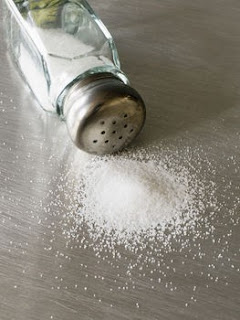Salt is primarily comprised of sodium and chloride, and comes from the sea in one way or another but there are considerable differences between table salt (probably the more widely used salt by the general populace) and sea salt. Commerical table salt is obtained from the salt deposits which are mined, heat-blasted and chemically treated. The process of producing table salt strips it of all minerals other than sodium and chloride, and some anti-caking agents are added to table salt to make it free flowing. Sea salt is obtained through the evaporation of seawater and as it is unrefined, sea salt maintains its natural mineral content (such as iron, sulfur and magnesium). Thus, sea salt has more flavour and will make food taste better than table salt.
Using salt properly is one of the most important skills in cooking. There is that saying “being worth one’s salt” - a foodies preferred salt to add finesse to meals is sea salt. You should use salt liberally in cooking, but do not under-season or over-season - it’s all about balance!



No comments:
Post a Comment